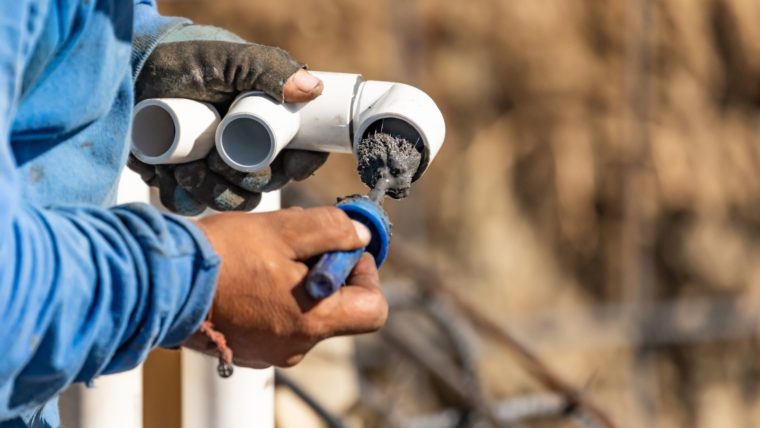The Importance of PVC Pipes
The materials used for plumbing pipes through the ages have quite an interesting history. The stories evolve from using lead and clay in the very early days and later finding out about lead poisoning to using polybutylene in the 70s––which was later revealed to be compromised by chlorine exposure. Today we still have many types of plumbing pipes available, and there are pros and cons to each of the materials. In this post, we will discuss the benefits of using PVC piping for your plumbing needs.
What Are Polyvinyl Chloride Pipes?
Since arriving on the plumbing scene as far back as the 50s, the range of PVC piping has been well developed. These pipes are made from a thermoplastic polymer, which means it is made out of plastic and vinyl. They are rigid, work well with highly-pressurized water, and work in various applications – from transporting potable water to draining. These pipes are ideal for drainage lines, water systems, and underground plumbing. They are also very common in earthquake-prone areas, as they don’t move or bend very easily.
Benefits of PVC Pipes
Resistance to Corrosion
Many piping materials face eventual corrosion, which can then threaten the integrity of drinking water. This is where PVC pipes shine. They are invulnerable to underground external and internal corrosion. Most cities face burst water mains, sometimes quite regularly, and this is due to corrosion of water pipes. PVC piping has proven to have the lowest pipe break rate when compared to cast iron, ductile iron, concrete, steel, and asbestos cement.
Resistance to Chemicals
PVC pipes also show excellent resistance to many chemical reagents and disinfectant chemicals. This makes them a top choice for most water infrastructure projects as they can carry the most strong acids, alkalis, aqueous solutions, fluorides, plating solutions, brine, mineral oils, and much more.
Reduced Blockages
The lining of PVC pipes is very smooth. This allows for decreased water flow resistance, reducing the opportunity for potential blockages and failures in a system with many connections. With PVC piping, water flows freely with maximum water pressure. This free flow of water also helps stop the potential build-up in sewage and wastewater systems. PVC pipes have proven many times over that they offer great long-term performance and extended trouble-free service.
Quick to Install & Leak-Free Joints
Research shows that PVC pipe installation is 30% faster than the same size concrete pipe.
Plus, the pipe’s smooth surface can offer leak-free joints, reducing water loss. And their elastomeric seals allow them to be quickly and easily joined – there’s no need to use electricity or find protection from the elements.
Long Life
Studies show the life expectancy of PVC pipes to be over 100 years. This and the fact that using PVC pipes reduces water main breaks and maintenance costs is a top reason to choose PVC piping.
Low Cost
Not only are the pipes themselves less expensive than other materials, but because they offer low breakage rates and a high life cycle, they are even more cost-effective. This is because PVC pipes reduce the need for maintenance and ongoing work. Installation is also reduced, as they are quicker to install and transportation is cheaper too because they are light-weight.
Handle Heavy Loads & Resistant to Tree Roots
This piping is very flexible and can bend without breaking, making it a good option for handling soil and heavy-duty traffic weight. On top of this, with fewer joints, PVC pipes are more resistant to root intrusion and, because the joints are fitted so tightly, they are also leak-free. PVC piping is not affected by the settlement of backfill around the pipe.
Positive Environmental Impact
Because they are leak-free, we see less water waste when using PVC piping. PVC products also need less energy and use fewer resources throughout their production. Because they are lighter, they require less energy and therefore less emission to transport and install. Their durability means replacement is not needed very frequently, and at the end of a PVC pipe’s life cycle, it can be easily separated from other plastics and recycled.
Health and Safety
PVC is a non-toxic, inert polymer and is the world’s most researched and tested plastic. It fulfils all international standards for health and safety and for the products and applications thereof.
Are There Any Disadvantages of Using PVC Piping?
The disadvantages are few, but it’s only fair to mention them.
- Warping: Like most plastics, heat can cause PVC to warp and melt. This means it is not well-equipped to transport hot water.
- Size: The sizing options for PVC pipes are limited, and the fittings used to connect PVC pipes tend to be bulky. This is a problem if you are working with tight spaces.
As you can see, with only two cons on the list, PVC Piping is a product of modern technology that offers reliable and durable service to a variety of users, including plumbers, contractors, engineers, operators, industries, utilities, and irrigation districts. Due to its number of advantages, PVC pipes are an obvious choice for new piping or to replace other traditional pipe options.
Call The Experts
Any homeowner can tell you that your plumbing system is one of the most essential parts of your house. If you need professional service, call the certified technicians at Accurate Leak. They can give you prompt service and repair any problems that you have. From a leak to a deep clog, their team of professionals can handle it. To find your nearest branch or how Accurate Leak can help you today, visit our website here.

